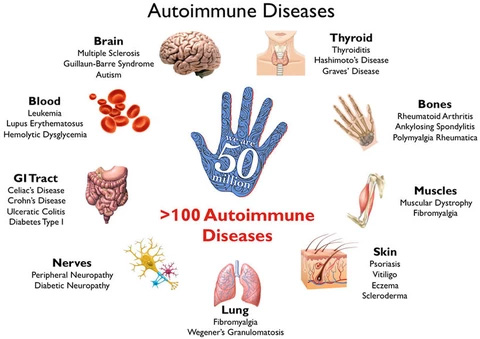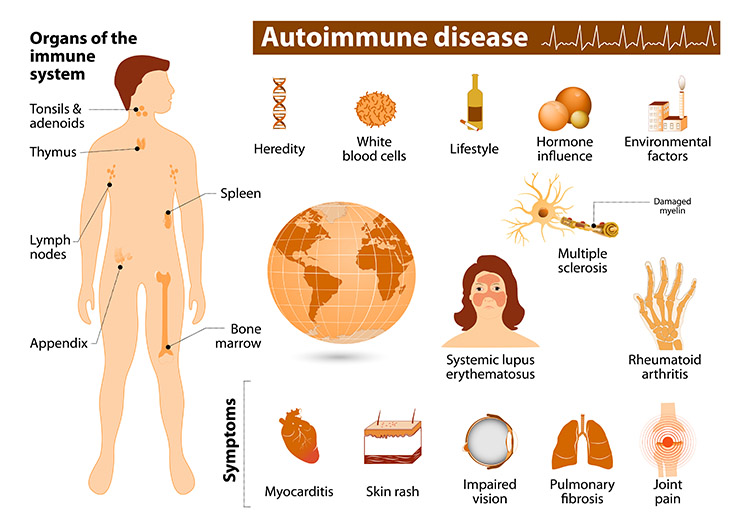Autoimmune Disease

What is Autoimmune Disease
A healthy immune system defends the body against disease and infection. But if the immune system malfunctions, it mistakenly attacks healthy cells, tissues, and organs. Called autoimmune disease, these attacks can affect any part of the body, weakening bodily function and even turning life-threatening.
Scientists know about more than 80 autoimmune diseases. Some are well known, such as type 1 diabetes, multiple sclerosis, lupus, and rheumatoid arthritis, while others are rare and difficult to diagnose. With unusual autoimmune diseases, patients may suffer years before getting a proper diagnosis. Most of these diseases have no cure. Some require lifelong treatment to ease symptoms.
Nearly 80% of people with a chronic autoimmune condition are women. These autoimmune diseases include rheumatoid arthritis, multiple sclerosis, scleroderma, lupus, Sjögren’s syndrome, and others. Researchers are conducting studies to understand why there is a sex-biased trend in this disease category.
Studies indicate these diseases likely result from interactions between genetic and environmental factors. Gender, race, and ethnicity characteristics are linked to a likelihood of developing an autoimmune disease.1 Autoimmune diseases are more common when people are in contact with certain environmental exposures, as described below.

Who gets autoimmune disease?
According to a 2014 study, women get autoimmune diseases at a rate of about 2 to 1 compared to men — 6.4 percent of women vs. 2.7 percent of men and often the disease starts during a woman’s childbearing years (ages 15 to 44).
Researchers are documenting the rapid increase in the incidence of autoimmune disease and they believe there are 3 primary reasons for this increase:
- Environmental factors like infections and exposure to chemicals, EMF’s or solvents.
- A “Western diet” is another suspected risk factor for developing an autoimmune disease because studies show eating high-fat, high-sugar, and highly processed foods is linked to inflammation, which appears to set off an immune response.
- A 2015 study focused on another theory called the hygiene hypothesis. Because of vaccines and antiseptics, children today aren’t exposed to as many germs as they were in the past. The lack of exposure makes their immune system prone to overreact to harmless substances.
Regardless of why your immune system attacks your body, the results of the attack can manifest with many symptoms which can be found below.
Common symptoms when your immune systems attacks your body
- General Fatigue
- Muscle Ache
- Swelling
- Redness
- Low Grade Fever
- Difficulty Concentrating
- Numbness or Tingling In Hands/Feet
- Hair Loss
- Skin Rashes
Common Autoimmune diseases
- Type 1 Diabetes
- Rhumatoid Arthritis
- Psoriasis
- Multiple Schlerosis
- Systemic Lupus Erhthematosis
- Inflammatory Bowel Disease
- Addison’s Disease
- Sjogren’s Synfrome
- Hashimoto’s Disease
- Mysthenia Gravis
- Autoimmune Vasculitis
- Pernicious anemia
- Celilac Disease
Treatment Protocols
Dr. Darling uses treatment plans based upon 30 years of successful treatments for different autoimmune diseases. Each treatment plan is unique to the patient’s specific circumstances and generally requires time to heal the body.
There are many new treatments that are not FDA approved where studies show are having positive impact autoimmune symptoms. One of those is stem cells. Contact us to learn more.
I want to get more information!
Fill out the form below and we will reach out to you shortly! If you want to schedule an appointment, please call 949-610-9950.

